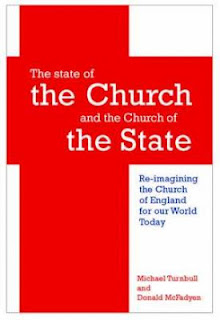Church and State
Review - Michael
Turnbull and Donald McFadyen, The state
of the Church and the Church of the State: Re-imagining the Church of England
for our World Today (DLT, 2012)
Despite the rather
long-winded title, this is a very interesting book that repays attention. Written by a former Bishop of Durham
(Turnbull) and a more recently ordained priest (McFadyen), it offers a vision
of the Church of England (CofE) at the heart of English society.
Inspired by Rowan
Williams’ remarks at his very first press conference as Archbishop-elect of
Canterbury that he longed to see Christianity able ‘to recapture the
imagination of our culture’, Turnbull and McFadyen offer an unapologetic and
inspiring vision of the CofE as the Established Church and a Church for England: “a church which belongs to
England and which serves England in all its manifestations” (p. 3).
The authors see the
CofE as a church with a particular vocation, “to live deeply within the nation,
insisting on a vision of human life which aims at the highest goals, and helps
shape ways of getting there” (p. 67).
This is a vision of the CofE in line with its greatest thinkers, Richard
Hooker and William Temple are mentioned often, and which sees the church as
existing for everyone, and not just for those who go to church. Concern for the survival of the CofE is then
secondary to its fulfilling of this vocation, with “the church risking even its
own survival in the process” (p. 83).
The CofE faces many
challenges: declining numbers, division over ethical issues, a media interest
in its conflicts not its benefits, a decline in clergy numbers and morale and
the shrinking of all voluntary movements.
But for Turnbull and McFadyn, the worst danger comes from the “sapping
of confidence” (p. 170). This book seeks
to stem that, and so I list a selection of the collection of inspiring and
confidence boosting descriptions of the CofE it contains:
- “The CofE was born out of turbulence and it will remain a turbulent church. It is deeply embedded in the psyche and culture of the English People” (p. 10)
- “No-one is ever turned away from a CofE church” (p. 19)
- “this balance of tradition, scripture and reason … is the genius of the CofE” (p.30)
- “the CofE has resources which society needs if it is to become the place for human flourishing” (p. 49)
- “the CofE is bigger than those who claim to belong to it and quite different to narrow congregationalism” (p. 103)
- “the CofE meets people where they are and unveils the truth about God as they go about their daily living” (p. 104)
There can be no
doubt that Turnbull and McFadyn really do believe in the value of the CofE, and
are doing their best to re-inspire its confidence.
But the CofE is not
without the need to change. Rather than
rush into change, Turnbull and McFadyn insist that a clear understanding of the
vocation of the CofE needs to be held before any change is planned. They note that the notion of one parish with
one priest has been changing for some time, but has been “planned only in a piecemeal
fashion” (p. 147). Proper research and
thinking will be needed, and over the course of the next two generations (!) a
new form of parish system should be constructed. It should remain geographically based, but
respond to new understandings of ‘the local’.
And the debate needs to be handled publicly so that everyone knows and
understands that the CofE is still present for everyone.
There are some
weaknesses to the book. It is rather
thin in its vision of the state that the CofE seeks to inhabit and bring about,
and over strong in suggesting the state’s need for the CofE (The Church in
Wales has been disestablished for nearly a century, and yet could share most if
not all of Turnbull and McFadyn’s aspirations for the CofE). But there is so much to admire in this book,
that it is well worth reading. Whoever
has the misfortune to become the next Archbishop of Canterbury could do worse
than to arm himself with the vision of the CofE it contains.
First published in Outlook (Derby Cathedral Magazine) July 2012
First published in Outlook (Derby Cathedral Magazine) July 2012



Comments